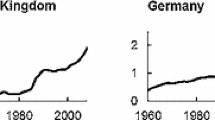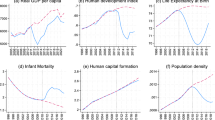Abstract
This paper examines the impact of economic freedom on income inequality using cross-sectional data for U.S. states. While previous research has explored this relationship internationally, the results have been conflicting. In addition, while it seems obvious that the large institutional differences across countries will impact income inequality, it isn’t so obvious that the smaller variation in policies among U.S. states can have a measurable impact. Can improvements in income inequality be used as a justification for marginal pro-market policy reforms at the state level, or is this argument applicable only to national-level institutional reforms?
Similar content being viewed by others
References
Alesina, A., & Perotti, R. (1994). The political economy of growth: A critical survey of the recent literature. World Bank Economic Review, 8, 351–371.
Alesina, A., & Rodrik, D. (1994). Distributive politics and economic growth. Quarterly Journal of Economics, 109, 465–490.
Ashby, N. J. (2007). Economic freedom and migration flows between U.S. states. Southern Economic Journal, 73, 677–697.
Ayal, E. B., & Karras, G. (1998). Components of economic freedom and growth: An empirical study. The Journal of Developing Areas, 32, 327–338.
Bartels, L. M. (2005). Economic inequality and political representation. Unpublished manuscript, Princeton University. Retrieved January 27, 2007, from www.princeton.edu/~bartels/economic.pdf.
Berggren, N. (1999). Economic freedom and equality: Friends or foes? Public Choice, 100, 203–223.
Berggren, N. (2003). The benefits of economic freedom: A survey. The Independent Review, 8, 193–211.
Bernstein, J., McNichol, E., & Lyons, K. (2006). Pulling apart: A state-by-state analysis of income trends. Retrieved May 1, 2006, from http://www.epinet.org/content.cfm/studies_pulling_apart_2006.
Birdsall, N., Ross, D. R., & Sabot, R. (1995). Inequality and growth reconsidered: Lessons from East Asia. World Bank Economic Review, 9, 477–508.
Cole, J. H. (2003). The contribution of economic freedom to world economic growth, 1980–99. Cato Journal, 23, 189–198.
Cole, J. H., & Lawson, R. A. (2007). Handling economic freedom in growth regressions: Suggestions for clarification. Econ Journal Watch, 4, 71–78. Retrieved January 25, 2007, from http://www.econjournalwatch.org/pdf/EJWCompleteIssueJanuary2007.pdf
Clark, G. R. (1995). More evidence on income distribution and growth. Journal of Development Economics, 47, 403–427.
Dawson, J. W. (1998). Institutions, investment, and growth: New cross-country and panel data evidence. Economic Inquiry, 36, 603–619.
De Haan, J. D., & Sturm, J. E. (2007). Handling economic freedom in growth regressions: Suggestions for clarification: A reply to Cole and Lawson. Econ Journal Watch, 4, 79–82. Retrieved January 25, 2007, from http://www.econjournalwatch.org/pdf/EJWCompleteIssueJanuary2007.pdf.
Esposto, A. G., & Zaleski, P. A. (1999). Economic freedom and the quality of life: An empirical analysis. Constitutional Political Economy, 10, 185–197.
Farr, W. K., Lord, R. A., & Wolfenbarger, J. L. (1998). Economic freedom, political freedom, and economic well-being: A causality analysis. Cato Journal, 18, 247–262.
Forbes, K. J. (2000). A reassessment of the relationship between inequality and growth. American Economic Review, 90, 869–887.
Grubel, H. G. (1998). Economic freedom and human welfare: Some empirical findings. Cato Journal, 18, 287–304.
Gwartney, J. D., Lawson, R. A., & Gartzke, E. (2005). Economic freedom of the world: 2005 annual report. Vancouver: The Fraser Institute.
Gwartney, J. D., Lawson, R. A., & Holcombe, R. G. (1999). Economic freedom and the environment for economic growth. Journal of Institutional and Theoretical Economics, 155, 643–663.
Hadi, A. S. (1992). Identifying multiple outliers in multivariate data. Journal of Royal Statistical Society, 54, 761–771.
Heckelman, J. C. (2005). Proxies for economic freedom: A critique of the Hanson critique. Southern Economic Journal, 72(2), 492–501.
Heckelman, J. C., & Stroup, M. D. (2000). Which economic freedoms contribute to growth? Kyklos, 54, 527–544.
Karabegovic, A., & McMahon, F. (2005). Economic freedom of North America. Retrieved May 1, 2006, from http://www.freetheworld.com.
Karabegovic, A., Samida, D., Schlegel, C., & McMahon, F. (2003). North American economic freedom: An index of 10 Canadian provinces and 50 US states. European Journal of Political Economy, 19, 431–452.
Kreft, S. F., & Sobel, R. S. (2005). Public policy, entrepreneurship, and economic freedom. Cato Journal, 25, 595–616.
Melkumian, A. V. (2004). A gravity model of legal migration to the United States. Unpublished manuscript, Western Illinois University.
Norton, S. (1998). Poverty, property rights and human well-being: A cross-national study. Cato Journal, 18, 233–245.
Ovaska, T., & Sobel, R. S. (2005). Entrepreneurship in post-socialist economies. Journal of Private Enterprise, 21, 8–28.
Persson, T., & Tabellini, G. (1994). Is inequality harmful for growth? American Economic Review, 84, 600–621.
Powell, B. (2003). Economic freedom and growth: The case of the Celtic tiger. Cato Journal, 22, 431–448.
Scully, G. (2002). Economic freedom, government policy, and the trade-off between equity and economic growth. Public Choice, 113, 77–96.
Sobel, R. S. (1999). Theory and evidence on the political economy of the minimum wage. Journal of Political Economy, 107, 761–785.
U.S. Census Bureau (1990). Current population survey. Washington: U.S. Government Printing Office.
Author information
Authors and Affiliations
Corresponding author
Rights and permissions
About this article
Cite this article
Ashby, N.J., Sobel, R.S. Income inequality and economic freedom in the U.S. states. Public Choice 134, 329–346 (2008). https://doi.org/10.1007/s11127-007-9230-5
Received:
Accepted:
Published:
Issue Date:
DOI: https://doi.org/10.1007/s11127-007-9230-5




